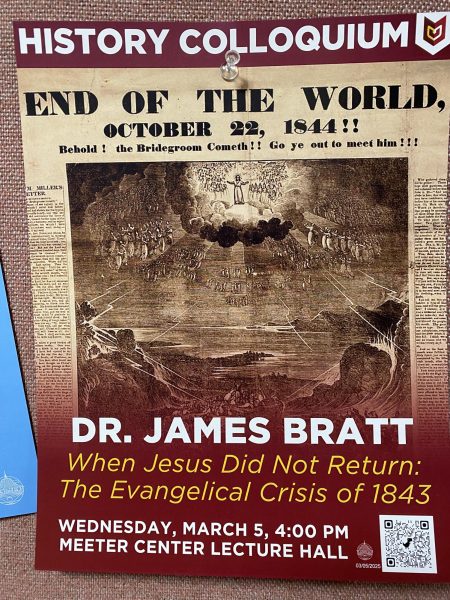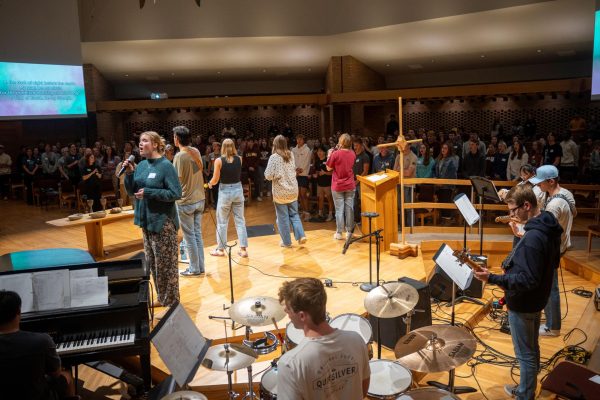Trump comments amplify “Merry Christmas” debate
In his recent comments at the Values Voter Summit, President Donald Trump reignited the “Merry Christmas” versus “Happy Holidays” controversy.
“We’re getting near that beautiful Christmas season that people don’t talk about anymore,” Trump said on Oct. 13. “They don’t use the word Christmas because it’s not politically correct… Well, guess what? We’re saying ‘Merry Christmas’ again.”
Though Republican presidential candidates frequently speak at the event during campaign cycles, Trump is the first sitting president to speak at the Values Voter Summit. According to CBS News, the statement received a standing ovation from Trump’s listeners at the annual gathering of social conservatives.
The comments continue a common theme from Trump’s campaign rhetoric, stirring a common complaint in many evangelical circles.
“If I become president, we’re gonna be saying Merry Christmas at every store,” Trump said while courting Iowa caucus voters back in 2015. The then-candidate also alluded to the Starbucks red cup controversy with this statement. He criticized the coffee company for producing a blank red cup instead of a Christmas-themed cup.
“Trump is trying to appeal to evangelicals,” explained history professor Kristin Du Mez, who researches American politics and religion. “He’s trying to rally the troops, so to say.”
The phrase “Merry Christmas” is a relatively recent touchstone for American Christians. According to Du Mez, seventeenth-century Puritans refused to celebrate Christmas, citing its lack of biblical support and association with the Catholic Church. American Christians did not begin celebrating Christmas until the 1800s alongside the broader American culture.
As the country became more diverse, companies and politicians began using “Happy Holidays” in their campaigns to appeal to a wider audience. Republican president Dwight Eisenhower even sent out a “Happy Holidays” greeting in the 1950s. The use of this phrase generated no controversy then.
In 2005, the dispute came to the nation’s attention when John Gibson’s book titled “The War on Christmas” was publicized on national television by “The Bill O’Reilly Show.” Every year following, O’Reilly ran a segment on the suppression of the holiday, including stories on public schools banning red and green cupcakes or censoring a production of “A Charlie Brown Christmas.”
This controversy motivated senior Rae Gernant to study the frequency of “Merry Christmas” and “Happy Holidays” in new sources as a sociolinguistics project last year.
“I went into the project thinking that there had been a shift. That’s what I had heard at church and at school and from my family,” she said.
However, after using the Corpus of Contemporary American English (COCA) to analyze data collected from ABC, NBC, FOX, CNN, CBS and NPR, Gernant discovered that “Merry Christmas” had always been the most commonly used phrase — at least in news sources — from 1990 to 2015. “Merry Christmas” had, however, dropped in overall usage over the years from three times to one-and-a-half times more than “Happy Holidays.” But the phrases actually dropped in usage together at the start of the millennium, which Gernant suggested may be related to the 9/11 attacks and the start of the Iraq War.
But individual news sources produced their own trends, Gernant noted, as the “almost exact opposition” of FOX and NBC data. The phrase “Merry Christmas,” she found, often spiked in frequency at conservative outlets because of the “Happy Holidays” debate. Since other media may not cover the controversy, they use the phrase less often.
Findings from a Pew Research Center study suggest a similar trend of political polarization among everyday Americans. Republicans are much more likely to prefer that store employees greet them with “Merry Christmas” whereas a vast majority of Democrats don’t have a preference between a more or less religious greeting.
Du Mez argued that Christmas should not be an argument over semantics but rather a time for humility.
“We’re talking about the incarnation, the greatest mystery of our faith–God becoming man,” she said. “So to use that as a bludgeon, it’s not effective.”
Instead of focusing on greetings, both Du Mez and Gernant encouraged a focus on combatting the materialism and consumerism surrounding Christmas.
“During my lifetime, it’s been a consumerist holiday more than anything else,” Gernant reflected. She wondered if most Americans, when hearing or using “Merry Christmas,” actually thought of its religious connotations.
“If we want to be concerned about Christmas and how our nation celebrates it, we can think about the consumerism and the materialism of the holiday and look at ourselves,” Du Mez said. “That’s where our true countercultural witness would come from.”






